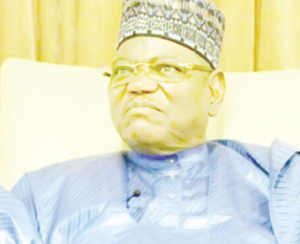PDP Chieftain on Tinubu’s Dominance and the PDP’s Future: Why it will be Difficult to Defeat Tinubu in 2027
PDP Chieftain on Tinubu’s Dominance and the PDP’s Future: Why it will be Difficult to Defeat Tinubu in 2027

In a recent interview, former Jigawa State Governor and ex-Foreign Affairs Minister Chief Sule Lamido, a key figure in the establishment of the Peoples Democratic Party (PDP), shared his perspectives on President Bola Tinubu’s political dominance and the challenges facing the PDP. Conducted by Senior Deputy Editor Taiwo Amodu, this discussion delves into the opposition party’s prospects for the 2027 elections, its internal struggles, and the impact of figures like Nyesom Wike on its fortunes.
Lamido, a founding member of the PDP, discussed the party’s persistent crises, attributing them to broader systemic issues within Nigerian institutions. He emphasized that the PDP’s problems are reflective of the general state of Nigerian governance and societal behavior. According to Lamido, the challenges are not unique to the PDP but are symptomatic of the nation’s larger issues.
Addressing the PDP’s recent electoral losses, Lamido urged a focus on the root causes of these failures rather than just the immediate problems. He reminisced about the party’s origins in 1998, aimed at uniting Nigeria after years of political instability. Despite past successes, Lamido believes the party has struggled to build on this foundation, now facing significant obstacles as it tries to present a viable alternative to the All Progressives Congress (APC).
Lamido also addressed speculation about internal party dynamics, particularly regarding Nyesom Wike, now a minister under Tinubu. He refuted claims that Wike was strategically placed to undermine the PDP, arguing instead that Wike’s actions are a reflection of the broader Nigerian political environment and its inherent issues.
On the matter of Tinubu’s political ascendancy, Lamido painted a picture of a formidable and tenacious leader who, despite not being universally supported, has managed to assert his dominance in Nigerian politics. He likened Tinubu’s hold on power to that of an emperor, suggesting that dislodging him in 2027 would be a formidable challenge.
Lamido’s reflections also touched on potential new political alliances, highlighting that any such efforts must prioritize genuine concern for Nigeria’s future rather than mere power grabs. He expressed reservations about any alliances formed purely out of political expediency.
In closing, Lamido addressed speculation about his own potential leadership of the PDP, revealing his preference for David Mark as a more suitable candidate for the party chairmanship due to Mark’s maturity and experience. Despite his own reluctance, Lamido’s insights provide a clear-eyed view of the PDP’s current dilemmas and the broader political landscape in Nigeria.
TRENDING SONGS
 Shock in Anambra: Bride Disappears Moments Before Wedding
Shock in Anambra: Bride Disappears Moments Before Wedding
 Nigerian Woman Returns ₦330 Million Accidentally Credited to Her Account
Nigerian Woman Returns ₦330 Million Accidentally Credited to Her Account
 APC Don Reach Morocco?’ VeryDarkMan Reacts to Seyi Tinubu Poster
APC Don Reach Morocco?’ VeryDarkMan Reacts to Seyi Tinubu Poster
 Bride Breaks Down in Tears as Wedding Meals Were Kept Secretly While Guests Go Home Hungry
Bride Breaks Down in Tears as Wedding Meals Were Kept Secretly While Guests Go Home Hungry
 Odogwu by Day, Robber by Night: How Marriage Joy Turned Into Tragedy
Odogwu by Day, Robber by Night: How Marriage Joy Turned Into Tragedy
 Nigerian Officials Allegedly Pocket N4–6B Weekly Through Smuggling Cartels at Seme–Badagry Border
Nigerian Officials Allegedly Pocket N4–6B Weekly Through Smuggling Cartels at Seme–Badagry Border
 Ahmad Yerima: Naval Officer to Face No Sanctions After Clash with Wike – Matawalle
Ahmad Yerima: Naval Officer to Face No Sanctions After Clash with Wike – Matawalle
 Trending Video: Muslim Man Joins Wife in Hallelujah Challenge ‘Dress Like Your Miracle’ Night
Trending Video: Muslim Man Joins Wife in Hallelujah Challenge ‘Dress Like Your Miracle’ Night
 Woman Seeks Advice as Late Brother’s Wife Refuses to Mourn Him Following His Death With Alleged Mistress
Woman Seeks Advice as Late Brother’s Wife Refuses to Mourn Him Following His Death With Alleged Mistress
 Nobody Cares About Fine Girls In The UK, I Miss Nigeria — Nigerian Lady Laments
Nobody Cares About Fine Girls In The UK, I Miss Nigeria — Nigerian Lady Laments
Share this post with your friends on ![]()













